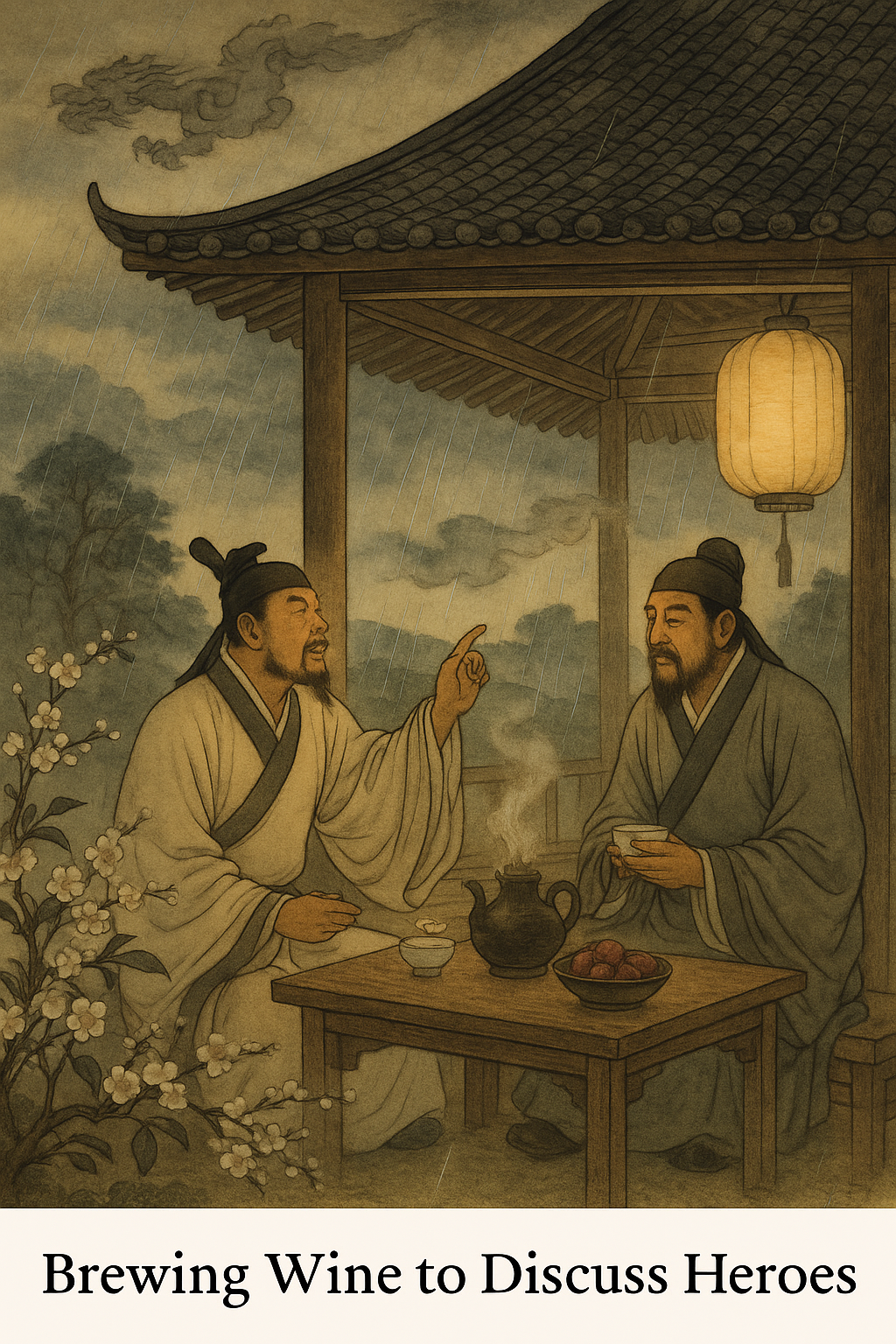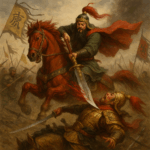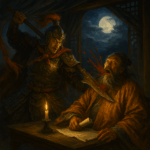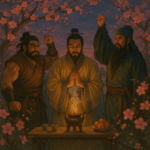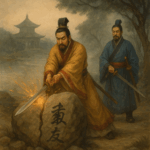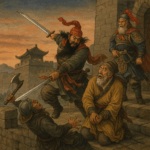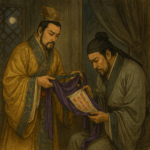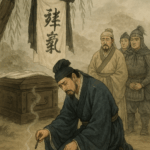Dong Cheng and the others asked Ma Teng, “Whom do you propose we enlist?”
Ma Teng replied, “I see that Liu Xuande, Governor of Yuzhou, is here—why not seek his aid?”
Dong Cheng objected, “Though he is the Imperial Uncle, he currently serves Cao Cao; would he dare join our cause?”
Ma Teng said, “At the recent hunt, when Cao Cao received the emperor’s congratulations, I noticed Guan Yu at Liu Bei’s back, blade raised as if to kill Cao Cao—only Liu Bei’s glance restrained him. Liu Bei may do likewise if asked; his heart burns against Cao Cao’s claws, yet he fears his own strength is insufficient. You should entreat him; he will surely agree.”
Wu Shuo cautioned, “We must not rush—let us deliberate carefully.”
With that, they dispersed.
That very night, Dong Cheng carried the imperial edict (“the sash‐edict”) straight to Liu Bei’s residence. The gatekeeper reported his arrival; Liu Bei came out to greet him and led him into a small pavilion, with Guan Yu and Zhang Fei standing guard. Liu Bei said, “Your presence at this hour must bear grave news.”
Dong Cheng answered, “By day we risk Cao Cao’s suspicion; by night we meet in secrecy.” He ordered wine. Dong Cheng asked, “At the hunt you restrained Guan Yu’s blade—why?”
Startled, Liu Bei protested, “How did you see that?”
Dong Cheng said, “No one else noticed—I alone observed it.”
Liu Bei could no longer conceal the truth: “My brother’s anger at Cao Cao’s arrogance overcame him—he nearly struck.”
Dong Cheng covered his face and wept, “If all loyal ministers were like Guan Yu, how could the realm fail to be peaceful?”
Fearing a trap, Liu Bei feigned surprise: “Why mourn peace when Cao Cao governs so well?”
Dong Cheng rose, indignant, “You are the emperor’s uncle—why feign ignorance when I bring you the highest mandate?”
Liu Bei declared, “I feared your sincerity might be a test.”
Dong Cheng then unwrapped the sash and displayed the blood‐inscribed edict. Liu Bei’s heart filled with sorrow and anger.
Dong Cheng next revealed their “Oath of Six”—the sworn conspirators:
- General of Chariots Dong Cheng
- Minister of Works Wang Zifu
- Colonel Zhong Ji
- Court Counsellor Wu Shuo
- General Wu Zilan
- Governor of Xiliang Ma Teng
Liu Bei said, “Since Your Excellency carries the emperor’s command to punish the usurper, how could I fail to pledge my service?” He bowed and signed the pact as “Left General Liu Bei.” Dong Cheng asked, “We need four more to make ten—shall we seek them?” Liu Bei agreed, “But we must proceed with caution and secrecy.” At the fifth watch they parted.
To allay suspicion, Liu Bei retired to his rear garden to tend the vegetables himself. Guan Yu and Zhang Fei asked, “Brother, why busy yourself with gardening instead of state affairs?” Liu Bei replied, “You would not understand my purpose.” They fell silent.
One day, Guan Yu and Zhang Fei were absent when Xu Chu and Zhang Liao, with dozens of soldiers, burst into the garden. “The Chancellor summons you at once,” they said.
Alarmed, Liu Bei asked, “What urgent matter?”
They only repeated their order. Liu Bei had no choice but to follow them into Cao Cao’s mansion.
Cao Cao laughed, “You’ve been busy with your gardening!”—seeing Liu Bei’s ashen face. Grasping Liu Bei’s hand, he led him into the back garden: “Gardening must not be so easy!” Liu Bei relaxed and replied, “Merely passing the time.”
Cao Cao pointed to green plums on a branch: “I recalled last year, during the campaign against Zhang Xiu, our troops were parched. I tricked them by pointing to a phantom plum grove—each man spat in hope of fruit and lost his thirst. Now I must reward these plums. And the wine is just right. Come, meet me in the pavilion.”
In the pavilion, plates of fresh plums and a kettle of warm wine awaited. They sat and drank deeply.
As the wine flowed, dark clouds gathered and rain threatened. A retainer pointed out to the sky a dragon‐shaped cloud. Leaning on the railing, Cao Cao asked, “Do you understand the dragon’s transformations?”
Liu Bei answered, “Not fully.”
Cao Cao said, “A dragon can grow large or shrink small; ascend into the heavens or hide beneath the waves. In spring it rides the season, as men in their prime roam the world. Thus the dragon symbolizes heroes. You, Liu Xuande, have traveled the lands—tell me, who today is heroic?”
Liu Bei demurred, “How can I discern heroes with mere eyes?”
Cao Cao urged, “Be not so humble.”
Liu Bei replied, “I owe my station to your mercy—in truth, I know not these heroes.”
Cao Cao laughed, “Though you have not met them, you have heard their names. Is Yuan Shu, with abundant troops and supplies in Huainan, a hero?”
Liu Bei said, “He sits atop his riches, yet lacks resolve.”
Cao Cao exclaimed, “I will soon capture him.”
Liu Bei asked, “What of Yuan Shao, scion of three generations of imperial ministers, who now holds Ji Province?”
Cao Cao laughed, “Yuan Shao blusters but balks at risk—no hero.”
Liu Bei tried again: “What of Liu Jing (Liu Biao) of Jingzhou?”
Cao Cao said, “A name without substance.”
Liu Bei proposed, “Sun Ce of Jiangdong?”
Cao Cao retorted, “He rides his father’s fame.”
Liu Bei suggested, “Liu Zhang of Yizhou?”
Cao Cao sneered, “A mere householder’s hound.”
Liu Bei asked, “Then Zhang Xiu, Zhang Lu, Han Sui, and the like?”
Cao Cao slapped his knee and roared, “Trifling men unworthy of mention!”
Liu Bei at last admitted, “Beyond these, I know no others.”
Cao Cao declared, “True heroes harbor bold ambition and boundless vision—enterprising the cosmos, swallowing heaven and earth. Who fits this mold?” He pointed first to Liu Bei, then to himself: “Today the only heroes are you and me.”
Startled, Liu Bei dropped his chopsticks. Thunder cracked overhead. He stooped to gather them, murmuring, “Even thunder’s might can startle us.”
Cao Cao laughed, “Does a man fear thunder?”
Liu Bei replied, “A sage knows thunder’s swift wrath brings change—how could one not respect it?”
Cao Cao, seeing the recovered chopsticks, suspected nothing. A poet later praised Liu Bei’s quick thinking:
“Amidst thunder’s roar, the hero is revealed—
A wavering hand all but betrays his zeal;
Yet swift he masked his fear in tactful art,
And proved adaptable in every part.”
The rain passed. Suddenly Guan Yu and Zhang Fei burst into the garden, swords drawn. Cao Cao and Liu Bei rose in alarm—only to see them salute.
Guan Yu said, “We heard our lord drank wine with Cao Cao and came to offer swordplay as amusement.”
Cao Cao laughed, “This is no Ambush at Hongmen—no need for Xiang Zhuang’s theatrics.”
Liu Bei joined in the laughter. Cao Cao ordered wine for the two heroes to calm their hearts. After a time, the gathering broke up and Liu Bei returned home.
Guan Yu whispered to Liu Bei, “We nearly cut him down!”
Liu Bei explained his gardening ruse: “I feigned humility so Cao Cao would know I harbor no grand designs. Yet when he named me hero, my hand trembled, and thunder saved my excuse.”
Guan Yu and Zhang Fei nodded in admiration of his cunning.
The next day Cao Cao summoned Liu Bei again. Mid-drink, news arrived that Man Chong had returned from scouting Yuan Shao. Cao Cao asked for details.
Man Chong reported, “Gongsun Zan was defeated by Yuan Shao. Zan built a towered fortress called Yijing with stores of 300,000 hu of grain, but refused to rescue his trapped men—fearing they would rely on rescue rather than fight. When he sent to Xuchang for aid, his messenger was captured. He then conspired with Zhang Yan to set fires as signals, but they too were caught. Yuan Shao’s forces ambushed Zan’s and burned him out. Zan then killed his wife and hanged himself—his household perished in the flames. Now Yuan Shao reigns in the north. His brother Yuan Shu in Huainan has grown decadent; his own officers have deserted. Shu recently ceded the imperial seal to Shao and intends to join him in the north. Were the two to unite, they could threaten the realm. I beseech you to act swiftly.”
Liu Bei was moved at the news of Gongsun Zan’s fate and recalled Zan’s earlier support; he also worried for Zhao Zilong’s whereabouts. He thought, “If I do not seize this moment to strike a path for my own escape, when will I?” Rising, he told Cao Cao, “If Yuan Shu marches north through Xuzhou, I will ambush him mid-route and capture him.”
Cao Cao laughed, “Present your petition to the throne tomorrow, and then raise the troops.”
The following day, Liu Bei formally reported to Emperor Xian. Cao Cao appointed him supreme commander over fifty thousand soldiers and dispatched Zhu Ling and Lu Zhao to accompany him. The emperor wept as he bade Liu Bei farewell.
That very night Liu Bei hastily packed his arms and horses, hung up his general’s seal, and prepared to ride out. Dong Cheng met him at the Long Pavilion, ten li from the city, and saw him off.
Guan Yu and Zhang Fei asked in alarm, “Brother, why such haste?”
Liu Bei answered, “I was a bird in a cage, a fish in a net—this journey frees me into open sea and sky. Ride hard!” And he urged Zhu Ling and Lu Zhao to speed their horses.
Meanwhile, Guo Jia and Cheng Yu returned from inspecting the army’s provisions. Upon learning that Liu Bei had been sent to Xuzhou, they hurried in to remonstrate: “Why entrust troops to Liu Bei?”
Cao Cao said, “To intercept Yuan Shu.”
Cheng Yu warned, “When Liu Bei governed Yuzhou, you wished him dead—and now you arm him. This is like setting a dragon loose in the sea; you invite endless trouble.”
Guo Jia added, “Even if you spare him, you should not send him away. ‘Spare an enemy one day and he will haunt you forever.’”
Cao Cao yielded and sent Xu Chu with five hundred men to follow Liu Bei as guard and to recall him if necessary.
As Liu Bei journeyed, Xu Chu’s vanguard stirred dust behind him. Liu Bei halted his camp and posted Guan Yu and Zhang Fei on either flank, arms at the ready. When Xu Chu arrived, he dismounted and entered the camp to summon Liu Bei back. Liu Bei said, “Your orders, General?”
Xu Chu answered, “By the Chancellor’s command, I beg you to return.”
Liu Bei smiled: “When on campaign, one may refuse royal summons. I go with His Excellency’s sanction; there is nothing more. Please return and deliver my reply.”
Xu Chu reflected, “The Chancellor trusts Liu Bei—I cannot force him to fight. I will heed his words.” He saluted and returned. Reporting to Cao Cao, the issue remained unsettled. Cheng Yu and Guo Jia urged anew: “Liu Bei’s refusal reveals his intentions.” Cao Cao replied, “Zhu Ling and Lu Zhao remain with him—he will not dare rebel. I cannot withdraw now.” Thus he abandoned the pursuit. A poet later wrote:
“His troops packed and horses primed, he raced away—
Remembering the imperial mandate hidden in the sash;
Breaking free from iron bars, he shook off every chain,
And flew like a dragon loosed upon the sky again.”
When Ma Teng learned of Liu Bei’s departure and Yuan Shu’s defeat, he too returned west to Xiliang.
Liu Bei’s forces reached Xuzhou, where Governor Che Zhou came forth to greet him. After a public banquet, Sun Qian, Mi Zhu, and others visited. Liu Bei then inspected his family and sent scouts to gauge Yuan Shu’s strength. They reported:
“Yuan Shu’s extravagant excesses drove his officers Lei Bo and Chen Lan to Mount Song. Shu’s forces dwindled. He finally ceded the emperor’s title to Yuan Shao. Now Shao summons Shu northward. Shu has stripped down his palace, loaded treasure and soldiers onto carts, and heads for Xuzhou.”
Realizing Yuan Shu’d arrive soon, Liu Bei led Zhu Ling, Lu Zhao, Guan Yu, Zhang Fei, and fifty thousand troops out to meet Yuan Shu’s vanguard under Ji Ling. Zhang Fei charged Ji Ling and slew him beneath his steed. Yuan Shu’s army attacked. Liu Bei divided his forces into three: Zhu Ling and Lu Zhao on the left, Guan Yu and Zhang Fei on the right, Liu Bei personally commanding the center. Before the city gates, he rebuked Yuan Shu: “You rebel against the Han—by imperial mandate I now punish you! Surrender and spare your guilt!”
Yuan Shu sneered, “You lowborn upstarts dare lecture me?”
He ordered his troops forward; Liu Bei disengaged, allowing his wings to envelop Shu’s army. The slaughter was so great that blood flowed in rivulets. Shu’s men fled in disorder, cut down by brigands Lei Bo and Chen Lan attuned to their disarray. Shu himself, wounded and with only a thousand ill‐armed survivors, fled to the riverside pavilions. In the swelter his rations ran out; only thirty hu of wheat remained, doled out to his soldiers who starved or died of thirst. Longing for honeyed wine, Shu commanded his cook to fetch honey—but only blood remained. He collapsed on his bed, convulsed, and died, spluttering blood—this was the fourth year of Jian’an, sixth month. A poet lamented:
“In Han’s great collapse, the sword‐drums roll—
Yet Yuan Shu’s pomp outran his soul;
Born to court, he dreamed himself king,
Only to thirst for nectar at death’s sting.”
Yuan Shu’s nephew Yuan Yin brought his uncle’s body and family to Lujiang, only to be slain by Xu Qiu, who seized the imperial seal and presented it to Cao Cao. Elated, Cao Cao made Xu Qiu Prefect of Gaoling—at last the sacred seal was his.
Liu Bei, hearing of Yuan Shu’s end, drafted a memorial to the throne and submitted it via Cao Cao. He sent Zhu Ling and Lu Zhao back to Xuchang, leaving his troops to garrison Xuzhou, then personally entered the city to welcome its people back to their fields.
Zhu Ling and Lu Zhao reported to Cao Cao that Liu Bei had left his troops behind. Furious, Cao Cao moved to execute them. Xun Yu advised, “Let him have them—what harm?” Cao Cao relented. Xun Yu then suggested writing to Che Zhou: that he should discuss the matter. Cao Cao agreed and secretly summoned Che Zhou, sending him an imperial missive. Che Zhou consulted Chen Deng. Chen Deng said, “Liu Bei will soon return from recruiting. Let your men lurk by the city gate. When he rides out, you seize him; I will pin down his rear with archers. All shall be done.” Che Zhou concurred and reported this plot to his father Chen Gui, who dispatched Chen Deng to inform Liu Bei.
Chen Deng rode forth and overtook Guan Yu and Zhang Fei on patrol. He told them of the plot. Zhang Fei, fuming, wished to charge forth. But Guan Yu counseled, “If we rush blindly, we play into their trap. I have a plan: we will disguise our men as Cao Cao’s troops and send a detachment to welcome Che Zhou—then slay him.”
That night, under cover of Cao Cao’s banners—worn by Che Zhou’s men—they came to the city gate at the third watch. The gatekeeper asked, “Who goes there?” They replied, “Cao Cao’s envoys bearing instructions for Zhang Wenyuan.” Che Zhou, suspecting nothing, debated whether to emerge, then opted to wait until dawn. The false troops cried, “Open now before Liu Bei learns of this!”
Che Zhou hesitated, but the shouting grew insistent. He donned his armor, drew his steed, and led a thousand soldiers out. Racing across the drawbridge he called, “Where is Wenyuan?” Only to see Guan Yu charging straight at him, sword raised: “Traitor, you dare ensnare my lord?”
Startled, Che Zhou fought briefly but was overwhelmed. As he fled back toward the gate, arrows rained from the walls. Falling at the drawbridge, he was beheaded by Guan Yu. Raising the head, Guan Yu cried to the city, “I have slain Che Zhou, Cao Cao’s trusted general! All others, stand down and live.” The troops threw down their arms and surrendered.
Guan Yu bore Che Zhou’s head to Liu Bei, reporting the plot. Liu Bei was stunned: “If Cao Cao should arrive—what then?”
Guan Yu replied, “We will greet him together.”
Filled with regret, Liu Bei entered Xuzhou. The townsfolk knelt and lit incense in his honor. He summoned Zhang Fei, who had already executed Che Zhou’s family. Liu Bei said, “After killing Cao Cao’s confidant, how can we rest?”
Chen Deng offered, “I have a plan to lure Cao Cao away.”
“Escaped from the tiger’s den at last,
We now contrive to still the wolf‐packs vast.”
But what scheme did Chen Deng propose? That, dear reader, must await the next chapter’s unfolding.
